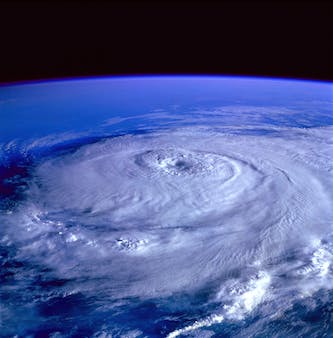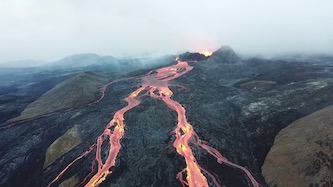Some smart computer programs can guess where big storms will go better than older ways of guessing. A team made a smart program called GraphCast that guessed right about a big storm in Canada three days before the old ways did. The old ways need to do lots of hard math and use big computers, but the smart program looks at what happened before to guess what the weather will do. The smart program is not ready to take over from the old ways, but it can help make better guesses faster.
The smart program did a really good job, better than the old ways, most of the time. It made guesses really fast and didn’t need a big computer. The old ways look at the air now to guess the weather, but the smart program learns from what happened before. The smart program guessed where the big storm would go nine days before it happened, but the old ways only guessed six days before. But because the weather is changing and getting more wild, it might be hard for the smart program to guess right about new kinds of big storms.
Original news source: AI could predict hurricane landfall sooner – report (BBC)
Listen
Slow
Normal
Fast
Group or Classroom Activities
Warm-up Activities:
– Charades
Instructions: Write down several words related to weather, technology, and predictions (e.g., storm, computer, forecast, program, math). Students take turns acting out these words without speaking, while the rest of the class guesses the word. This activity will help familiarize students with key vocabulary from the article.
– News Reporter Role-play
Instructions: Students work in pairs. One student acts as a news reporter and the other as a meteorologist who has developed the GraphCast program. They role-play an interview where the reporter asks questions about how the program works and its advantages over old methods. This encourages students to practice speaking and listening skills using information from the article.
– Word Association
Instructions: The teacher says a word related to the article (e.g., “weather”). Students take turns saying the first word that comes to mind that is also related to the article’s content. This activity fosters quick thinking and vocabulary recall.
– Sketch It
Instructions: Students are divided into small groups and given a word or phrase from the article (e.g., “smart program,” “big storm,” “hard math”). Each group has to draw a representation of their word or phrase without writing any words. They then present their drawing to the class, explaining how it relates to the article, which helps with comprehension and speaking skills.
– Future Predictions
Instructions: Discuss with the students the concept of weather prediction. Have each student write down their own prediction about the weather for the next day or week, using simple English sentences. They can then share their predictions with the class and discuss why they made those predictions, encouraging the use of future tense and critical thinking.
Comprehension Questions:
1. What can some smart computer programs do about big storms?
2. What is the name of the smart program that guessed the storm?
3. How many days before did GraphCast guess the storm right compared to the old ways?
4. Why are the smart programs fast at making guesses?
5. How do the old ways guess what the weather will do?
6. How many days before the storm did the smart program make a guess?
7. Why might it be hard for the smart program to guess right about new storms?
Go to answers ⇩
Listen and Fill in the Gaps:
Some smart computer programs can guess where big storms will go better than older ways of guessing. A team (1)______ a smart program called GraphCast that guessed right about a big storm in Canada three days before the old ways did. The old ways (2)______ to do lots of hard (3)______ and use big (4)______, but the smart program looks at what happened before to guess what the weather will do. The smart program is not ready to take over from the old ways, but it can help make better guesses faster.
The smart program did a really good job, (5)______ than the old ways, most of the time. It made (6)______es really fast and didn’t need a big computer. The old ways look at the air now to guess the weather, but the smart program learns from what happened before. The smart program guessed where the big storm would go nine days before it (7)______, but the old (8)______ only guessed six days before. But because the weather is changing and getting more wild, it might be hard for the smart program to guess right about new kinds of big storms.
Go to answers ⇩
Discussion Questions:
Students can ask a partner these questions, or discuss them as a group.
1. What is a storm?
2. Do you like watching the rain from a storm? Why or why not?
3. Have you seen a big storm before? How did you feel?
4. What do you do when there is a big storm?
5. How do you think people guess the weather?
6. Do you think computers are smart? Why?
7. Do you like to know if a storm is coming? Why or why not?
8. Do you think it is good to guess the weather fast? Why?
9. What is a smart computer program?
10. Do you think learning from the past is important? Why or why not?
11. Do you think new computer programs can help us? Why?
12. How would you feel if a computer made a mistake about the weather?
Individual Activities
Vocabulary Meanings:
Match each word to its meaning.
Words:
1. smart
2. program
3. guess
4. storm
5. old
6. ways
7. weather
8. computer
Meanings:
(a) Different methods or strategies to do something
(b) The condition of the air outside, like if it’s sunny or rainy
(c) Not new, but has been around for a long time
(d) Something that is clever and knows a lot
(e) A set of instructions that tells a computer what to do
(f) To make a prediction without knowing for sure
(g) A big, powerful wind with lots of rain
(h) A machine that can do math and store information
Go to answers ⇩
Multiple Choice Questions:
1. What is the name of the smart computer program that can guess where big storms will go?
(a) WeatherMaster
(b) StormGuess
(c) GraphCast
(d) SmartStorm
2. How many days before the old ways did the smart program guess right about a big storm in Canada?
(a) Five days
(b) Seven days
(c) Ten days
(d) Three days
3. How does the smart program guess what the weather will do?
(a) By looking at what happened before
(b) By using big computers
(c) By doing lots of hard math
(d) By looking at the air now
4. Did the smart program make guesses faster than the old ways?
(a) No
(b) Yes
(c) Sometimes
(d) It’s not mentioned in the article
5. How many days before the big storm did the smart program guess where it would go?
(a) Five days
(b) Two days
(c) Nine days
(d) Twelve days
6. Why might it be hard for the smart program to guess right about new kinds of big storms?
(a) Because the weather is changing and getting more wild
(b) Because the smart program is not very smart
(c) Because the old ways are better at guessing
(d) Because the smart program needs a big computer
7. What do the old ways look at to guess the weather?
(a) What happened before
(b) The smart program’s guesses
(c) The big computers
(d) The air now
8. Can the smart program take over from the old ways?
(a) Yes, it’s already taken over
(b) No, it’s not ready yet
(c) Sometimes, when it wants to
(d) It’s not mentioned in the article
Go to answers ⇩
True or False Questions:
1. The smart program is not ready to take over from the old ways, but it can help make better guesses faster.
2. The smart program did a really poor job, worse than the old ways, most of the time.
3. The smart program guessed where the big storm would go nine days before it happened, while the old ways only guessed six days before.
4. The smart program called GraphCast guessed wrong about a big storm in Canada three days before the old ways did.
5. The old ways need to do lots of hard math and use big computers to guess where storms will go.
6. The smart program ignores what happened before to make its guesses, while the old ways look at the air now.
7. Some computer programs can guess where big storms will go better than older ways of guessing.
8. The smart program looks at what happened before to make random guesses about the weather.
Go to answers ⇩
Write a Summary:
Write a summary of this news article in two sentences.
Check your writing now with the best free AI for English writing!
Writing Questions:
Answer the following questions. Write as much as you can for each answer.
Check your answers with our free English writing assistant!
1. What is the name of the smart computer program that guesses storms?
2. How many days before the big storm did the smart program guess right?
3. Did the smart program need a big computer to make guesses?
4. What do the old ways of guessing storms use to make guesses?
5. Can the smart program guess new storms all by itself?
Answers
Comprehension Question Answers:
1. What can some smart computer programs do about big storms?
Some smart computer programs can guess where big storms will go.
2. What is the name of the smart program that guessed the storm?
The smart program is called GraphCast.
3. How many days before did GraphCast guess the storm right compared to the old ways?
GraphCast guessed the storm right three days before the old ways did.
4. Why are the smart programs fast at making guesses?
The smart programs are fast because they look at what happened before to guess the weather, not like the old ways that do lots of hard math.
5. How do the old ways guess what the weather will do?
The old ways look at the air now and do lots of hard math to guess the weather.
6. How many days before the storm did the smart program make a guess?
The smart program made a guess nine days before the storm happened.
7. Why might it be hard for the smart program to guess right about new storms?
It might be hard because the weather is changing and getting more wild, and the smart program learns from what happened before.
Go back to questions ⇧
Listen and Fill in the Gaps Answers:
(1) made
(2) need
(3) math
(4) computers
(5) better
(6) guess
(7) happened
(8) ways
Go back to questions ⇧
Vocabulary Meanings Answers:
1. smart
Answer: (d) Something that is clever and knows a lot
2. program
Answer: (e) A set of instructions that tells a computer what to do
3. guess
Answer: (f) To make a prediction without knowing for sure
4. storm
Answer: (g) A big, powerful wind with lots of rain
5. old
Answer: (c) Not new, but has been around for a long time
6. ways
Answer: (a) Different methods or strategies to do something
7. weather
Answer: (b) The condition of the air outside, like if it’s sunny or rainy
8. computer
Answer: (h) A machine that can do math and store information
Go back to questions ⇧
Multiple Choice Answers:
1. What is the name of the smart computer program that can guess where big storms will go?
Answer: (c) GraphCast
2. How many days before the old ways did the smart program guess right about a big storm in Canada?
Answer: (d) Three days
3. How does the smart program guess what the weather will do?
Answer: (a) By looking at what happened before
4. Did the smart program make guesses faster than the old ways?
Answer: (b) Yes
5. How many days before the big storm did the smart program guess where it would go?
Answer: (c) Nine days
6. Why might it be hard for the smart program to guess right about new kinds of big storms?
Answer: (a) Because the weather is changing and getting more wild
7. What do the old ways look at to guess the weather?
Answer: (d) The air now
8. Can the smart program take over from the old ways?
Answer: (b) No, it’s not ready yet
Go back to questions ⇧
True or False Answers:
1. The smart program is not ready to take over from the old ways, but it can help make better guesses faster. (Answer: True)
2. The smart program did a really poor job, worse than the old ways, most of the time. (Answer: False)
3. The smart program guessed where the big storm would go nine days before it happened, while the old ways only guessed six days before. (Answer: True)
4. The smart program called GraphCast guessed wrong about a big storm in Canada three days before the old ways did. (Answer: False)
5. The old ways need to do lots of hard math and use big computers to guess where storms will go. (Answer: True)
6. The smart program ignores what happened before to make its guesses, while the old ways look at the air now. (Answer: False)
7. Some computer programs can guess where big storms will go better than older ways of guessing. (Answer: True)
8. The smart program looks at what happened before to make random guesses about the weather. (Answer: False)
Go back to questions ⇧















